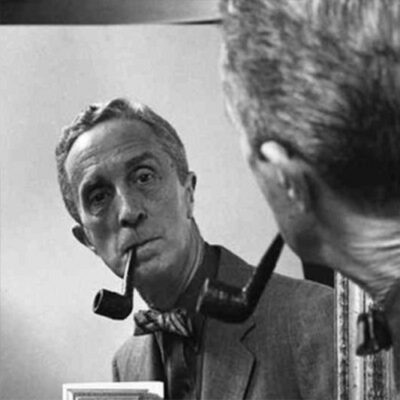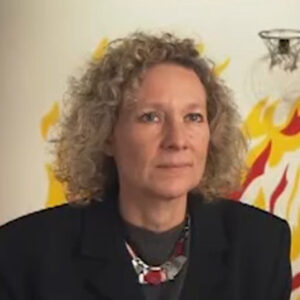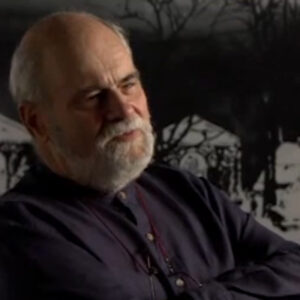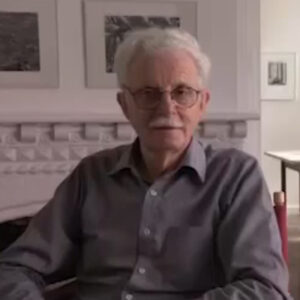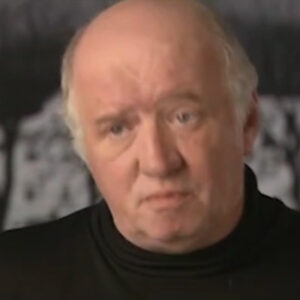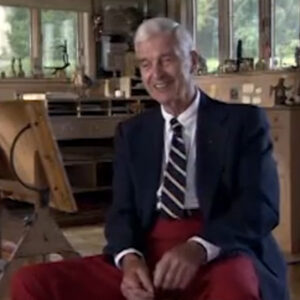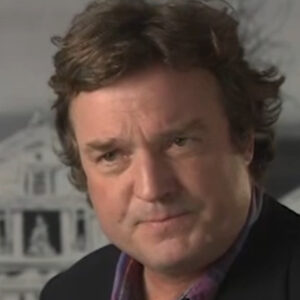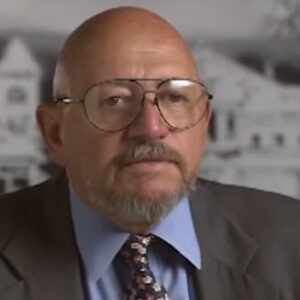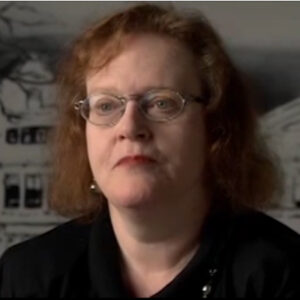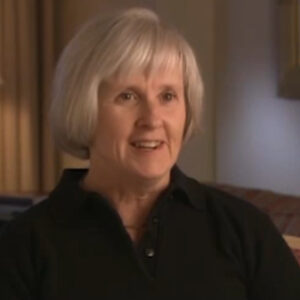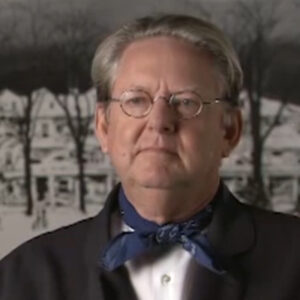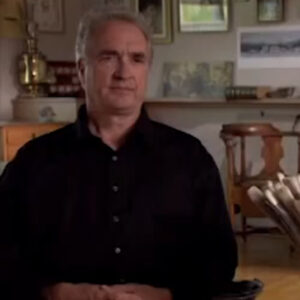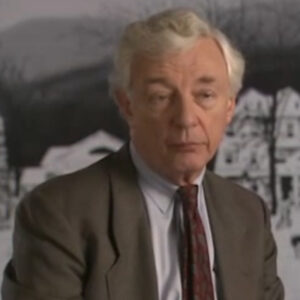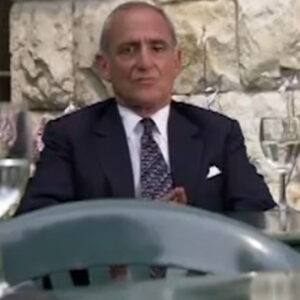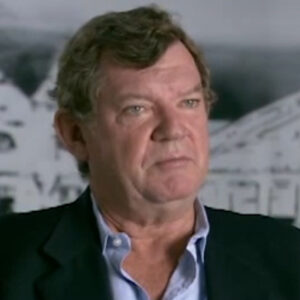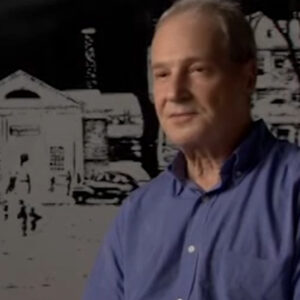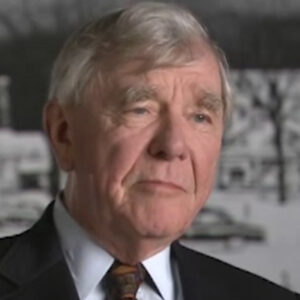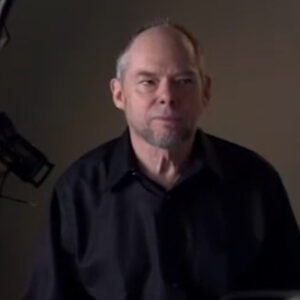Speaker Well, I met him back in Larchmont, I actually met his family before I met him. And I met Mary and the three boys, and they came to the house and we kind of played it. In fact, they were always the little brothers I never had because I only had a sister. And. But the first time I met him, I was posing for him. And Tom Sawyer. I think it was Becky. The name of the. I really don’t know why I was around seven or eight years old, so I can’t remember. And I remember sitting on top of the table and I had a hoop skirt and I was posing. And in those days, it was live. It wasn’t photographs. And I remember having to keep still on certain. You know, until he got the right sketch and he did sketches, they all did sketches first and then they took it from there. And then the photograph came later, as I remember, it was up in Vermont that I remember my father and which he hated. He hated using photographs, but he had to. We were no longer in New York. We no longer could get models and we can no longer pay the price that they were, you know. So then I remember posing for him a lot up here, and especially when I was a teenager and in my early 20s. And that was it. And when he moved to Stockbridge, I no longer posed for him.
Speaker Well, we’ll come back to the experience. But tell me about Rockwell’s relationship with your father and how they knew each other.
Speaker They shared the same building. I was going to say studio, but they didn’t.
Speaker There was a building in New Rochelle that they. Had studios, they rented stuff, they had the north light, which they had to have, and they. Met there, and I think I really can’t remember too much, but they.
Speaker I think that’s when they became friends and then when Rockwell moved up here, I guessed they had mom and dad as a guest. My father fell in love with Vermont and the fishing and they found the farmhouse, which they converted with 13 dead cats in the walls. But they did it then. And the barn became my father’s studio. And Norman built a house up here. And they bought the property, I think, from the Inmans daddy and Burt Imit and who we knew for some time after that. They were great people. There wasn’t very many people up here. There. You know, there was just the town people and the the other artists came later. But it was my father and Norman at first. Well, for people who don’t know your father, my father is me, Chafer. And he did also.
Speaker He also did covers and illustrated for the Saturday Evening Post and for the Cosmopolitan magazine. Not as we know it today, but, you know, Good Housekeeping and the American magazine, which is now no longer exists. And I think there was probably others, but I can’t remember.
Speaker It’s been quite some time. But your photos are the most.
Speaker So your father, Marquel, had a really special relationship, right? Yes. They were almost like brothers. They. We talk over their work, which was very consuming. You talk about workaholics. These two men, all four of them. The other two also. They lived and breathed their work.
Speaker And I’ve never found that dedication. But of course, I’m not in that field anymore. So I. But they really were something. But they had the same sense of humor. They took delight in people. Little situations, especially Norman.
Speaker Yeah, I would say he took delight in human nature and in a very big way. That’s the thing that made him what he was. Is this great? Interesting. Well, the human comedy or whatever. And he always saw things that no one else did. And he would bring it up and he would discuss his what he was going to do. Sitting under our apple tree and where my mother and father held many cocktail parties. Well, they weren’t parties. They were after the cooling off period. They’d come after a day’s work and all four of them and their wives would come and we’d have what my mother used to call the Children’s Hour. Just tell me who the four of them are. That was, of course, Norman. And my father. And then there was John Atherton and George Hughes. And they were all both of them were a cover artist. They both did covers of the Saturday Evening Post. And I think it was mostly covers because I know my father. It did illustrate was still doing illustrations as well as covers at the time. But I don’t know whether George Hughes did. I can’t really remember. As I said, I wish I was a little bit better when it came to, but they were dumb.
Speaker They all sit and talk and discuss their day’s work if they were having any problems. They would also sit and discuss that. They also discussed the world at large. And I used to listen into the conversation. I’ve never heard conversation like that. It’s strange to say that I thought that Norman, my father and well, John and John and George were very sophisticated, which you wouldn’t really I don’t know whether people would want me to use that for Norman Rockwell, but he was there was a side of it that was extremely sophisticated. And I know my I’ve always felt that my mother and father were the most sophisticated people that I’ve ever known.
Speaker And I remember just listening to the conversations and thinking that, well, they rather spoiled before I expected everybody else to discuss things in this capacity that they do.
Speaker And I don’t know, I.
Speaker I just loved hearing them talk. But I do remember speaking of their work, they used to when they were having deadline troubles and so often they did because they had to make certain. Time was of the essence with them. They would. I remember my father getting phone calls from Norman, also from other artists. Oh, the cover, the ones I just mentioned, sometimes at 3:00 in the morning. And they would go over there and help and discuss and get them through it. And because I remember getting up in the morning and finding nobody there. And so it was really I would say that was quite you’d call that dedication. Let’s put it that way.
Speaker So did they talk about what it meant to be an illustrator and how that if that was different from an artist? How did they.
Speaker Well, I can remember my father always the next picture was going to be the picture the best. And I think Norman felt the same way, too. I mean, you could tell the back his work. It was always this one is going to be it. This was, I guess, the way a novel, this the greatest story ever told his greatest American novel or something like that. They were they wanted to paint the best. Illustration or I shouldn’t say painting, because they were illustrators. They weren’t. Although I have a lot of ah, my children have a lot of my father’s paintings on the wall. I find that, you know the difference between my father and Norman Rockwell. You could easily hang Norman’s. The human interest was always there. But my father’s illustrations, some of them are, I remember. And when we lived in New Rochelle. There was one it straighten that was hanging up as you go up the stairs. There was a narrow little paneling there. And then these stairs turned to the left and there it was, the in-law. It was Lorna Doom and one man strangling the other. And I never thought anything about it until I brought my friends home from school and they would go, you know, like that. And so I realized I was kind of different. Were they competitive with each other? No, they were completely different.
Speaker They painted in a different realm. There was no competition among all four of them. I really think they just enjoy each other’s company and. Took from each other the different things they could. As I said, the conversations were unbelievable and I think that they brought up certain subjects and they would discuss certain things they wanted to do. My father would give me things to read, like he had an.
Speaker Oh, an illustration, he was gonna do a story and I would read.
Speaker You know, the most of it.
Speaker And then he would say, well, what should I illustrate? Take part of it and illustrate. And I would do a few sketches I when we would discuss it and which one, which subject or which how it should go. No, this was mostly covers. He did. And but he would discuss certain situations with us that he saw. He got a wonderful idea. Something happened in town. He’d come back and he’d discuss it. And but my I felt my father did a lot of post covers. But as I said, it was illustration, too. And I like the illustrations because we would discuss the composition and the sketches he would give me. And he would say what, what, what this should be and what that should be.
Speaker And a life here in Arlingham shaped or changed Rockwell’s work. And having.
Speaker I know my mother and father were rather I don’t think that Westchester County was exactly their thing.
Speaker There was too much going social life going on. As I said, they were completely dedicated to their work. And this, I guess you would call it distracting. And I think that’s one reason Norman was the first to come up here.
Speaker And then my father followed very quickly. He’s just fell in love with Vermont. And there’s a certain I think every artist needs a certain peace and quiet. I’m a designer and I know I can’t if it’s a lot. There’s a lot of hubbub going around distractions. I just can’t do it.
Speaker You know? So.
Speaker The Iraq war really drew on this community. That’s right. I mean, in terms of the people I’m feeling, I’m sort of an idealist. He did a good one.
Speaker He actually he he loved people. And the more as I said, he just took delight in human nature.
Speaker And they.
Speaker When we first moved up here, they kind of looked at us, you know, and we were different and. But then after a while, he would go to Grange meetings. He would go to the church socials. He would see the square dancing. And he’d get a lot of his ideas. In fact, I think it seemed to me that all the Grange meetings, freedom of speech, I think now I’m not sure.
Speaker But that was probably born there in his mind that gave, you know, germ to it, because that’s exactly the way they would stand up and they would talk and then they would discuss things. And he he just loved it. They really did. But you see, with my father, he had to create his scenes and with illustrations and except when he did covers for this Evening Post. And of course, there were those were military. So that was it. But it sounds like kind of an idyllic. It was. Oh, it really was. I look back in those days when I’m having a bad hair day, I think back to those days. And it gives me a great deal of comfort thinking even though the war was raging in Europe.
Speaker It was we had our own world here. And it was. It was wonderful. It was just I learned so much for. About life in general and, well, about work, about designing. And I knew then that I want to go to just, you know, to Pratt was where I first went. And then I went to the art students league. And that all follow through because of, I think, my mentors, I used to call them. That was all for them.
Speaker And so so I it really was quite something.
Speaker Kind of like the American dream. Yes, it certainly was. Was what was people down here? Yeah.
Speaker It was very much.
Speaker As I said, I, I really. Don’t know when I’ve ever felt so complete as I did when I was with these four men and their wives. We could discuss anything. I can’t even remember what their politics were. We just. I don’t know whether they even had any or not. It was just their philosophy that was constant.
Speaker I’ve just learned so much. And. As I said, I grew from there.
Speaker And.
Speaker It it kind of spoiled me for the kids my own age when I was only a teenager and I expected them to talk on the same level and they it just didn’t happen. And of course, you couldn’t expect it to. But I did join in some of the conversations. But my mother was wonderful about.
Speaker Her philosophy and everything she was. Great.
Speaker I really was like living a dream world. And as I said, I I suppose I should feel guilty because the war was going on in Europe, but I really was a wonderful experience.
Speaker When you think of Rockwell’s images, which in many ways was kind of straight out of Arlington in places like this, in a literal sense, I mean, do you think he was painting reality or was he only has definitely painting reality.
Speaker That was his whole thing. Where is my father? Was fantasy land more or less, you know, swashbuckling adventure and that type of thing. He painted a lot of Westerns and Indians attacking and so forth and so on, whereas Norrin picked up on people, the people around him and the situations. And I do remember when he came over one morning, my sister and I and my father and I, we were all sitting around having breakfast and he came in and he I think he’d been away on a day to give a speech of the Boy Scouts of America.
Speaker And I think that’s what it was. As I said, this was some years ago.
Speaker And he was telling us all about the speech and all his experiences there. And the thing that’s fascinated me. He had a rather protruding Adam’s apple and there was one fly that wouldn’t remove itself. It kept attacking it. It kept going up and down on it. And I would my sister and I, you know, kept looking at this and we we were just enraptured with this fly. So after he left, he had breakfast with us. And after he left, he said, I had those girls also enthralled and that, you know, in my speech that I made and all my experiences there. And so my mother told me and he said, Mom, I said. Didn’t you notice the fly riding up and down on his Adam’s apple? It really wasn’t, you know, and I. He had a wonderful sense of humor. So my mother told him and he said, oh, shucks. She said, I really thought I had them going, therefore.
Speaker So that was the kind of person he was. He never got upset at me.
Speaker Some people would have taken offense to that thing. Well, you know, I mean, what was that all about? But not Norman.
Speaker He got a sense of humor. And he had a shot. He everything was so very humorous to him. And he saw the human side of everything.
Speaker It was. So that was the way he saw life in general.
Speaker And it was wonderful, not cynical the way. And, you know, it was really wonderful because it there’s so much cynicism out there. I think today. And when I look back. He especially but all four of them had what you call a lust for life. And I don’t think they could have done the work they did if they didn’t. I really don’t.
Speaker That was interesting.
Speaker More than interesting, it was wonderful. Tell me more about posing for him some of the things you put. Well, I was Willie Gilliss girlfriend.
Speaker And he was a poor little Willie Gillis was a buck private in the Army, and he Norman Invision, you see, this is the sense of humor report.
Speaker He envisioned.
Speaker Oh, a blond, a very glamorous woman being his girlfriend.
Speaker And he chose me. And now we’re talking ancient history here. So but anyhow, I remember one time I was posing. He was had me he had a bit all made up.
Speaker Maybe. Right.
Speaker So we’ll pick up what? OK.
Speaker Just a start. Yeah. Let’s pick up where for Williams. Willie Gillis was a buck private in the Army. He was just a simple G.I.. And Norman envisioned him with a very glamorous girlfriend, very blonde bombshell, which he chose me. And as I said, this is rather like ancient history, but that’s the way he wanted it. But. One time I one of the posing for him was. He had a bed all made up. And I was there in curlers, which I didn’t like at the time, but I was supposed to be sleeping. And it was New Year’s Eve. And I was supposed to be dreaming of Willie Gillis. His pictures were all over the bed and they were sort of looking down on me at the foot of the bed. There was an envelope. I had just received a letter from him. Lee Schaffer, my whole address on this thing on the envelope. And when that got published, I received mail from all over the world from servicemen. And because my address was on there and they could see it and that was Norman’s, she had very realistic. No two ways about it. And so that was my mother wasn’t exactly happy. But if things died down eventually, but I was all I’ve had, it was great. I just enjoyed it. I was at the age where, you know, in my late teens where, you know, boys dresses, you know, clothes or, you know, the whole thing made. A lot of it was just very important at that time. So did he kind of direct to IKO? Oh, yes.
Speaker But he was very gentle and I posed for him and he was very gentle in what I was. You know, posing me, although I, I could, you know, he asked. I mean, he would tell me what he wanted and I would do it.
Speaker But my father, I always my head was around and my or my my arm was, you know, in these positions where. But as I said, it was all illustrations. I don’t think I posed for my father for a cover because it was always very.
Speaker More he man stuff, you know. But some people said Norman Rockwell was really almost like a movie director, that he would kind of act out. Yeah, freshens, they all did. Well, tell me about them.
Speaker He set up scenes like I was telling you about the bad, also about a car I was posing. This wasn’t Willie Gillis, but I was supposed to be posing in a car and the truck driver looking down on me. And I can remember he had this a wheel all set up. Nothing. Not a real car, but he had props. They all did.
Speaker And they all could have been directors, producers, anything. I could envision all of this. And my father was the one that said, you know, coming out of a movie didn’t like. I could have done that a lot better. And and I think, Norman, I really did. But he wasn’t as vehement as. Is my father, my father was a little outspoken at times, and he could be very, you know, what can I say, outspoken.
Speaker What else were you alone? Homecoming.
Speaker I was in the homecoming. My father and my mother posed for it. My sister, Mary Atherton, John Ascertains daughter, Grandma Moses, Mary Rockwell, Norman was in it, as you know.
Speaker Tommy Rockwell and Jerry Rockwell, I think Jerry Rockwell is the one that was coming home. I remember I was a sort of in the background and we have lot of those.
Speaker They have made those into all kinds of things. And your mother, I think it once was strictly a sharp shooter. She was a photographer who was because my mom, my mother, Elizabeth Schaefer, was a photographer and she did all my father’s pictures and photographed all of them.
Speaker And I believe that Norman used Jean Pellom. And he lived up here, too. And he also was a an artist. They my mother also not only took the pictures, but she developed and printed them at the same time. I don’t know whether she took any of Norman’s baby, if he ever got stuck, that he. But she. She did everything. She always got the models for everybody. She did the makeup. She, as I said, did the photography and took the picture as well as developed and print them. She was very talented, but my mother was quite an artist herself because that’s where my mother and father met at Pratt. So I guess it stands to reason that she would be. She was a very good help me to my father, and I think she didn’t quite a bit for Norman to that. I remember the last thing he said to me when I saw him last. He said, I remember your mother well. She was such a wonderful cook.
Speaker But she was. She was. She was a wonderful cook. But she posed for Norman. Yes, she did. Yes, she did. Yes, she did. Quite a few. She did. Why? Because you don’t hear my question.
Speaker She posed for my thought for. For Norman Rockwell. And my father also.
Speaker When they first came up here.
Speaker And I think there was a couple of I’d have to point them out. But she did a lot of posing and at first and then I guess I became of age, my sister became of age, and then we did. We took over and then the townspeople and Norman was really getting into homespun, you know.
Speaker And so that. It was.
Speaker I think yes, I think he grew.
Speaker I think he did. Well, I shouldn’t say this, but I suppose I think he did his best paintings in Arlington. But that’s debatable. I mean, it depends on which what you’re looking for and what some thought he meant.
Speaker He grew. I think he developed hair.
Speaker And he was at his peak and so was my father. I know my father after he left four month. Wasn’t it just while they were getting older? What can I say? You know, I mean, you do reach your peak. I know myself, you know, and that’s it. You know, that’s that’s a rather tabling off after that.
Speaker But maybe it was something about this place, too.
Speaker I think so. I think they were very happy here and I think a lot having the war go on in Europe. If we didn’t feel we felt that this was a bit of escapism. And yet we they were fully aware of it, too. But there was no television when we were up here.
Speaker Absolutely no television, we have the radio. And that was what? I mean, my children can’t believe that I never grew up with television, but that was the way it was. I actually my grandchildren as the ones I can’t believe.
Speaker Well, I’m a senator, as I guess some people pointed out, that Rockwell didn’t really paint the gritty reality of the war. I mean.
Speaker No, no, no, he didn’t. That’s why he took the Willie Gillis. He saw the oh, the book private that he was a very human being, you know, very.
Speaker So just a very.
Speaker Plane. Oh, Army soldier. Oh, Buck private. He was just.
Speaker He really took the simple person, not the person with that was on top of the. You know. He really. Could sympathize with the person. Well, I should say at the bottom, but the simple.
Speaker And so. The. Really?
Speaker I think that was his contribution to the war, except for the Four Freedoms, of course, was they will be jealous and.
Speaker That really.
Speaker All right. I can’t remember how many Willie Gillis pictures I posed in one fighting over Willie Gilliss mail mailbox with me standing over a gal that was supposed to have received a letter from Willie Gillis and said that and the one I think in bed. And those were the two who posed for a while ago. You know, I can’t remember. I can’t remember who posed for him at all. But Rockwell got a lot of people right here in the community. Yes, I he I think he lived up in Sandgate. I think that’s where he lived way beyond because we lived on the Sandgate border. Do you remember other people in the community around here, though, Rockwell used as models?
Speaker You know, I went to school in Manchester and then I would get home weekends and I didn’t. Really? Remember, too many of the other.
Speaker I know my father used a schoolteacher in one of his illustrations that posed with my mother a love scene, but that was a part of it. I can’t remember. I know Norman used a lot of models from here. A lot of them.
Speaker And Henny did the same thing in Stockbridge. But I can’t remember, you know. Exactly. Because when he was working, nobody disturbed any of them, you didn’t dare. And they’d come up for air. I guess lunch sometime my father would skip lunch. My mother had to remind him. And I know Norman was the same way. Just. He would forget about meals entirely. He would just, you know.
Speaker Tell me about the four freedoms. How what you remember about that?
Speaker I remember his going down to. Washington and trying to get the war bond drive to buy them. To sell war bonds, my and my father went with him because he was doing the military. He wanted to do the military series, different aspects of the military.
Speaker And they went down there and they were turned down.
Speaker And I remember my aunt remembers this especially they came back. They were under the apple tree having ah. And the two guys came in off the train and they were very dejected. And they said it just wasn’t it didn’t go. And Mary Rockwell was the one, according to my aunt, that spoke up. Why don’t you take them into the Saturday Evening Post and see what they had to say about it. And. That’s exactly. What they did and they saw Ben hips and it was a go.
Speaker So that was then my father did 14 of the million and he did the Four Freedoms and.
Speaker That was the way it went. And it was it turned out to be very successful and I think it worked out for the best. Do you remember Rockwell as he was painting them? Was he struggling with ideas or anything about that, that you. I never remember him struggling at anything. And everything was such a delight to him to paint. But I know he did because my father wouldn’t come over at his place at three o’clock in the morning if things were, you know, but I don’t remember.
Speaker He just didn’t get like my father, my father would get very agitated when things weren’t going well and or he had a deadline and he just couldn’t get it done. And it seemed to me the deadlines that he couldn’t get done were always around Christmas when we would leave. Now, we would spend a lot of our Thanksgivings we’d spend here with the Rockwells. But Christmas whereas down in Long Island, with my mother’s family, where the Thanksgiving is like freedom from want.
Speaker Yes, I. I remember all I remember all of them, but I don’t remembers seeing him paint them.
Speaker He. I just. As I said, I was in school and.
Speaker Very active life of my own at that particular time. But I mean, the feeling of Thanksgiving here in Arlington. So do you think that’s what he drew on for his freedom to wander?
Speaker Oh, yes. I guess. I mean, we. I think a lot of it. I think the war in Europe, things coming back. We didn’t have television, but we had Life magazine.
Speaker And it’s just part of the four freedoms, freedom of want, freedom of speech and everything like that. And as I said, I think the Grainge meetings, he drew on that for the freedom of speech.
Speaker Hi. But I mean, it’s it’s amazing the power of that image. I guess it is. The post covers were so incredibly have such an impact on people, right?
Speaker I mean, yes, some people are still collecting the old covers. Wherever they have flea markets, they have them. They’re quite costly. And we’ve tried to get a few of them and everything. But it’s amazing when you’re growing up with all this. It just this is all. It was marvelous.
Speaker But you never thought that. You would like to have it. Keep still and then photograph it in your mind for the rest of your life to have it. You know, so that you could. You know, relate it later and have it become a part of history or whatever, you know.
Speaker But it was just fascinating. Really was.
Speaker You must have a lot of memories of that video. I do.
Speaker Oh, wonderful memories. I. I used to come and he was very relaxing, too.
Speaker I used to get right in the middle of whatever he wanted. And.
Speaker He would.
Speaker Just tell me a little bit about what he wanted and then I would perform. You know, I’ve looking back, I don’t know how I did it, but I did it, you know, but it was fun. I remember enjoying it immensely. But I’m in the studio, right, writing back is.
Speaker Where he did most of his. Camera and photography and everything I posted there. And if I didn’t have to do or he didn’t have to tell me too much, I. I got right in the middle of it, you know, and he. Was very I mean, I was good at giving directions. Where is my father? I always had to kind of guess second guessing and he was very, very good at that and very easy to pose for, a very good natured. He was just a sweetheart all the way around and. But I’m not saying it wasn’t fun posing for my father because it was because everything was very adventurous. He had a lot of spies and he was doing all kinds of drama and things like that. So. So that was exciting. It was very different. So, you know, it was interesting that way.
Speaker Just tell me about how Rockwell came to build the studio here.
Speaker I really don’t know. I am sorry to say I don’t whether he built it or he had a there was a little barn that he converted because I know my father did. I really don’t know anything about that. All I know is when he moved, it was there and I started modeling for him.
Speaker But what I’m getting at is why did he move the story of a studio burning?
Speaker Oh. He knew he hadn’t been up here too long. When my. I remember waking up in the middle of the night, my father, mother told me that the Rockwell studio was on fire. And the next day we went to see it. And I think it was burnt almost to the ground. I have no idea. I can’t remember. Probably they told me what caused the fire. But at this point, I can’t remember. But he didn’t want to rebuild it. He wants to start all over again. And.
Speaker He.
Speaker Bought this house. And with the studio and I don’t know whether it was worth it, and he converted it like my father or not. I really don’t know. But that’s where I posed. I did all of my modelling there for him here in this studio, not the other one. He was I don’t think he was there too much. How did he react to the burning Myrdal fire?
Speaker He took it in his stride, like he took everything. He was very good natured. I don’t remember him. He probably was very upset, but, you know, I was 14, I 13 or 14 when that happened, it seemed to me we were hardly up here when that when the fire was. Had burnt his studio down. I don’t think we were up here to long before that happened. But I. He seemed to take it in stride. What right on? Nothing. Would interfere with this work. I don’t think any of them, you know.
Speaker But he he continued on.
Speaker We’ve talked about what a workaholic he was, was, we’ll see. Ambitious, very ambitious.
Speaker He wanted this. I think.
Speaker He.
Speaker It was I remember, a February and he.
Speaker And Mary and Max and John Atherton and Casey and George Hughes came over to the house and we had had a terrible one, snow storm after another, and mother said, I’m going to have them over. Even if you have to get out horse and sleigh, you’re coming. And because everybody had been pretty well snowed in. And I remember sitting in the living room, we we’re having our children’s hour and our cocktails and there was a fire. I remember sitting on a big chair and the fire was raging in the fireplace because it was very cold that night. And Norman have received a.
Speaker So mail and in it was. Not a criticism. Exactly to the painting. But somebody noticed. Something that was not technically perfect or just some little thing, but he was rather upset about it.
Speaker Not at all. But just he was upset and. So I remember my father saying, hi, what what difference does it make? What’s that got to do with Paty? And remember John Astatine and George, you said the same thing. They said, just forget it, you know?
Speaker And he said, I don’t want to forget it. I want to become a household name. Well, with that, they just my father was.
Speaker What do you want?
Speaker For what? I mean, and I remember John Atherton was really IBT, they really were forever upset with him. And I said I turned around to all of them and I took my glasses clink to his and I said, go for it.
Speaker And he did.
Speaker And I felt that was sort of the turning point because I he room I remembered after that he went down to Hallmark, who wanted to purchase some of his Saturday Evening Post covers that were Christmasy. And they were gonna make them into cards. I remember Winston Churchill had some cards. I mean, paintings that were going to be a whole Hallmark was going to use as greeting cards. I. And he said and I said something about how I had a couple ideas for cards. And I was a designer and I said. He said, sure, I’ll take them along. And I did.
Speaker And he took them. And he went down there and they offered me a great, very nice job down there.
Speaker And Joyce Hall interviewed me at the I think the Plaza Hotel in New York City. I remember him sitting there wearing spats and. They had arranged for me to come down there. And I was. They had a boarding house all picked out and everything like that. An informant had arranged most of this. And my card, by the way, one second prize and the hallmark, some kind of a contest. I really to this day don’t know what it was all about. But anyhow, so they were all very. Everybody was thrilled for me.
Speaker But I turned it down. I would just didn’t want to leave. I was living in New York City and I didn’t want to go to Kansas City and I got stage fright or something. And I remember they were upset. Even Norman was upset with me. Hello. I mean, I was in New York at the time, which was good, but I remember they were really.
Speaker But it was seemed to me that was the point in which I saw him go for it.
Speaker And.
Speaker So, I mean, do you think the others that evening and afterwards felt that he had chosen commerce and sort of art in some way, that he wasn’t a real artist because he.
Speaker No, I don’t think so. I think he they didn’t see my father always felt that his peers were the only critics.
Speaker I mean, other illustrators. And. Or painters or whatever, you know. He just didn’t see why this matter to him so much. But I could see it. I mean, we’re here for such a short time. And he forgot it. Go for it. As I said to him, so. I was just the way I feel about things.
Speaker Why do you think they reacted so strongly, though? My.
Speaker I don’t know. I really I think he. I think they felt that it didn’t having to do with art. That, uh.
Speaker They really just. Didn’t you know I’ve been being accepted by your fellow artist was enough for them? Now, John Atherton has a painting in the Metropolitan Museum, Museum of Modern Art, Contemporary Art.
Speaker And I think that my father has no good law and I can’t think of him. In Delaware, illustrators, they have system.
Speaker They have a museum of all the illustrators was told. But first day, I can think of the name of this. Well, it does not so sorry. Swipe for tractor goes by.
Speaker Living with the country can be noisier than I’m finding it. Oh, dear.
Speaker So he I really don’t know, I I just think that art was art to them. And what other people thought.
Speaker But you see, you could tell by Norman’s paintings that he was into the human element with a human, you know, the.
Speaker People it was a people person. What more can I say? And they’re liking his work meant a great deal to him.
Speaker I might not that my father didn’t care, but I think he just gave it a lot of.
Speaker It was more important to him, for Rockwell also cared that he wanted to be thought of as an artist also. Right. Oh, yes, definitely. Definitely worth. Yeah, he definitely was.
Speaker He wanted to be known for his. And he was terrific. Painter, our illustrator, artist. I guess illustration is all, oh, yeah. I think he was he wanted to. He wanted it both ways. They wanted everybody to appreciate him, not only his peers, but everybody. And. But anyhow, he received that and I’m glad. But I just remember that night because I felt that that’s all. It might not have happened there, but I feel I’d like to think that it did for me.
Speaker So what do you think? Does he have it both ways in the end? I mean, do you think.
Speaker Oh, definitely has it both ways in the end. Very definitely. I think he’s achieved a lot greater than I ever thought he would. Achieve his goals. What his goals were. And in fact, I think he even would be surprised. Or he I think he was surprised at what he achieved.
Speaker And.
Speaker But anyhow, do you remember about when he left Arlington and why?
Speaker I was New York City at the time. I was working for the Buttock Pattern Company and I don’t remember. I was just there and I was when he left. I was engaged to. No, I know I kissed not he because I remember coming up here on my honeymoon and he had another little house built where my husband and I spent our honeymoon for about a week. It was on the road back road here and. Norman wasn’t. Saturday nights was a little too much for him with the square dancing. And he had to get up early the next morning and work. And he it was quite noisy. So this house was built, this little cabin type of thing, which is now a full fledged house. It’s been, of course, bought and added on. But anyhow, he said, we always called it honeymoon cabin, and that’s where we spent our honeymoon.
Speaker And Mary was so cute, stocked it all full of food, didn’t have any heat. So we had to use the fireplace. And I remember we had one blizzard and. They entertained us so beautifully and we came up here and the hues, the ascertains say all, you know, I fact, I met.
Speaker Quite a lot of people there at.
Speaker George and Casey Hughes is a cocktail party for us at that time.
Speaker And I was wondering if you remember anything about, you know, Rockwells like Mary’s troubles with drinking, like one of the reasons that they left here to go to Stockbridge. Well, that’s the reason he did.
Speaker I just wasn’t mentioned. Well, other people have said, OK. Even a Sunday did so. Oh, yeah.
Speaker I think in this day and age, you do. I think it’s. Everybody has problems now. And we talk about them where we didn’t before, and but I do think that I know that Mary was very troubled and she used my mother would come over and talk. My mother. Wood was quite as the psychiatrist with her, as I told you, my mother was unbelievably wonderful person, but she would talk to my mother a lot. And but it got so that my mother and father were. They moved first, and I think my father got stymied up here, I think he felt it was time to go back to New York City. So he rented an apartment. That’s where my husband, I were married. And soon after that, the Rockwells went to. What Stockbridge?
Speaker What do you think was troubling, Mary? Did he give me a sense of or.
Speaker She was extremely intelligent person. And I think. A lot of it was. Maybe she wanted her own identity. That’s the way we all discussed it among ourselves. I mean, the. They are the group that I told you about. The artist group. I think. She needed, as I said, to have her own identity. I think she. Felt that. You know, when somebody I wish if if she had been, I think. Just. A plain housewife. I know I shouldn’t say plain better block that one, but anyhow, just a.
Speaker Somebody that was there to cook to. To raise children and everything like that, but Mary was extremely intelligent. She entertained some fascinating people, writers. And I remember meeting one of them that won the some award for the great novel. What? What does that.
Speaker When a novel novelist wins an award winning The Yankee from Olympus, I can remember the title, but I can’t remember the name.
Speaker Name of the woman, but she had won that the top award for a novelist or her of that particular year. And Mary entertained her up here for a couple of days. And I met her and it was we had some fascinating conversations. And she was a very intelligent woman, very intelligent. So I wish they all were. All these gals were as I said, it wasn’t just the the. The hardest the post cover artists that I had named a John and George and Norman and my father, it was the wives also got in on the conversation and I learned a lot from them, too. They all were. None of them were dumb or stupid women.
Speaker And.
Speaker So I think you see with my mother, she shared in all my father’s work, whereas Mary didn’t he she didn’t take my Norman’s pick, you know, the photographs. She didn’t do the costumes and makeup, the hair, everything. And you know that that wasn’t her thing. Whereas my fourth. My mother was an artist. And so that just. They were partners. I often said, you know, there wouldn’t have been a meet Chafer without my mother. They were they were partners in whatever they did. But Norgren did. I don’t think Norman needed anybody. And maybe that was the problem. I think women, especially today, they need to be felt and needed and don’t get me started on my show.
Speaker But, Rockwell, in a way, it was a very private man. I mean, it’s worthless.
Speaker I think his work was all consuming and his, you know, and he.
Speaker Well.
Speaker Not that he couldn’t talk about other things because but it’s just that he.
Speaker This was it for him. And.
Speaker I as I said, I think that she had a lot to offer in.
Speaker Didn’t feel that. She had a place and but they.
Speaker She started going to Stockbridge from here and then that’s just. Couldn’t continue. Naturally, the way it had been. And as I said, my mother and father had food. My father was having problems with his work and he wanted to have a new environment. Stimulation. New York City and the Days artiste. That’s where the TV’s are right across the street. I guess you know all about the book.
Speaker I mean, the one Rockwell did have some troubles later in life. I’m like, do you remember anything about the famous artist school?
Speaker Did your father ever know? Just very vaguely. My father didn’t get in on that. He wouldn’t do it. Why would he? The same argument. He as I said, it had nothing to do with art.
Speaker Well, just start over. Tell me, because you didn’t hear my question. What I’m talking about. Yeah, but your father just explained that your father didn’t want to get on on the second the famous go.
Speaker No, he he didn’t feel that he got in on anything like that because it just wasn’t him. He he didn’t feel it had anything. He didn’t feel he had anything to contribute. His idea of teaching somebody would be to be in a room, an art room studio with a hit. In fact, he would very much like to have done that.
Speaker He would have been, I think, a fairly good teacher. But anyhow, he just didn’t feel that this was him. And it had nothing to do with art. Well, we’ll get back to that same thing. You know, he had definite views on.
Speaker What?
Speaker Is expected of an illustrator or are an artist. And he was very firm and very stubborn, very stubborn person.
Speaker Loved him dearly, but very stubborn. What did he say about Rockwell getting involved with the famous Never. This see his choice? They all did. I think Atherton did, too. John Atherton did. I don’t know whether George Hughes did. I’m sorry. Did what? Because if nobody’s hearing my questions. Oh, yeah.
Speaker I think John Atherton got in on the famous artist school.
Speaker I don’t think so. I really don’t know much about it because it all happened kind of. I was out of here and my father didn’t do it. So, you know, it was you know, it turned out those kind of a scandal of some sort around.
Speaker But I really don’t remember. I just remember that there. There was money involved where there wasn’t. It was a tricky kind of a deal. And there was a lot of shenanigans or something going on. But I really don’t want to quote I mean, say anything because when you’re not too sure of the subject, it’s better to be paying so well.
Speaker What does it feel like to be sitting here? You must have so many memories of this place over.
Speaker Sells nostalgia, very it was. Very.
Speaker You know.
Speaker They say, I have beautiful memories. And I’ve. I think I bored my grandchildren talking about them and my children. But I do. I have wonderful memories, and on bad days, I can just take them out and reveal them. And it was a wonderful experience growing up with Norman Rockwell and John Atherton and George Use. And of course, my father knew Chafer Rockwell was going to Indore when his. Oh, yes, definitely. He’s gonna be a house. How a household name forever. Because even my grandchildren, I know of him more than they know their own great grandfather.
Speaker But, you know, it’s a. It’s to be expected. That’s my father. That’s where you want it. That’s, uh, that’s it. But it’s so funny.
Speaker I do remember the last time I saw Norman. I was in Stockbridge and I don’t know whether he had any store he had. I think he’d been ill. He had had one stroke. My father had gone up to visit him and he didn’t recognize my father and my father was quite upset. But I don’t know why, because my mother had had several strokes before she was taken. But anyhow. Norman was coming out of his studio or some place and he was on a walker or no, he was on two canes and he came up and I said, I don’t know whether I came up to visit. And Molly, his third wife, said to me, Oh, you go, he’ll love to see you, but don’t be surprised if he doesn’t remember you. And I said, OK. I said, I just want to say hello because we were passing through and he came out on his two canes and he saw me and his two canes went like that. And he threw his arms around me, said, Oh, Lee and I all got to start crying. And I said, Well, I didn’t know whether you’d remember me or not. He said, I would always remember you because, well, he was like a second father to me. So that was, you know, another thing I should mention. He really was. He was a lot of times when I was up at boarding school and. I would come home and my father and mother were off shooting, taking photographs of the next post cover. They were our illustration. They would take me into their house and I would stay there on the weekends because I was just up here in Manchester. And so I I never told my father that he recognized me.

